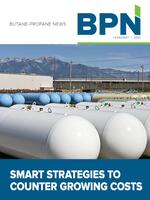
Editor's Note: The following column originally appeared in the April 2007 edition of BPN.
Ferrellgas was victorious in a recent binding arbitration that took place in Fort Myers, Fla. The matter involved a flash fire at a customer’s home that occurred while the customer was attempting to put his outdoor patio grill in operation. The arbitrator ruled in favor of Ferrellgas based on his findings that there was no breach of duty by Ferrellgas, that the customer’s claim was based on pure speculation, and, most importantly, that the customer assumed the risk.
PATIO GRILL
In 1995, Ferrellgas installed a propane grill on James Atkins’ patio. The installation was according to code and was not vented. In 2004, Atkins refinished his patio and bought another gas grill from Ferrellgas. Ferrellgas agreed to install the grill free of charge, and, in fact, gave Atkins a 10% discount on the grill.
Ferrellgas delivered the grill to Atkins’ home in December 2004. However, Atkins was still in the process of installing the countertop for his patio and refused installation at that time. Atkins was supposed to call Ferrellgas to set up an installation appointment once his outdoor kitchen was ready for grill installation.
DO-IT-YOURSELFER
Rather than calling Ferrellgas to install the grill, Atkins decided to do it himself. Compounding the problem, he failed to call Ferrellgas to inspect his installation. As a result, Ferrellgas had no knowledge that the grill had been put to use. When Atkins attempted to use his grill in January 2005, an explosion occurred, causing second-degree burns on his legs.
Atkins filed suit against Ferrellgas, claiming that Ferrellgas was liable for his burns because vents would have prevented the explosion, and because Ferrellgas “negligently” failed to provide ventilation for the grill enclosure in 1995.
Atkins argued that, because Ferrellgas did not install his current grill, he was “forced” to install it himself. As a result, it was not vented. If Ferrellgas had only installed the grill, reasoned Atkins, Ferrellgas would have (or should have) vented the grill according to the language of the installation manual.
ARBITRATION
The parties agreed, pursuant to a provision in the Master Agreement for Propane Sales and Equipment Rental between Ferrellgas and Atkins, to arbitrate the dispute. For this reason, the dispute was not submitted to a jury. Instead, it was referred to a private arbitrator. Pursuant to the Master Agreement, this arbitration was binding.
After a hearing, the arbitrator ruled in favor of Ferrellgas, stating that any evidence of the elements of negligence was speculative, and, in any case, nullified by Atkins’ own actions. According to the arbitrator, a duty on the part of Ferrellgas possibly existed if it agreed to install Atkins’ grill. However, even if Ferrellgas did agree to install the grill, according to the arbitrator, Atkins frustrated the agreement by delaying the installation of the grill when it was delivered. The arbitrator decided that, when Atkins installed the grill himself without notifying Ferrellgas before or after the installation, Ferrellgas was prevented from installing the grill correctly or inspecting the installation.
CHAIN OF CAUSATION
Regarding the ventilation issue, the arbitrator found that the 1995 grill installation was done properly because neither the code nor industry practice required venting for grills connected to hard gas lines. Only grills connected to portable cylinders require venting, and because both the 1995 and 2004 grills were not attached to portable cylinders, venting was not required. Thus, Ferrellgas met any duty it had.
In addition, even if venting was required, the arbitrator agreed with Ferrellgas that there was no evidence that a lack of venting caused or contributed to the accident. In order to side with Atkins, according to the arbitrator, one would have to speculate on a number of factors regarding links in the chain of causation. Determining that a lack of venting caused the accident required an assumption that there was a defect in the gas system, the defect caused an ignitable mixture to develop, and the ignitable mixture would not have developed if the grill was vented.
ASSUMPTION OF RISK
According to the arbitrator’s ruling, the evidence did not support these assumptions because no leak was found in the system before the accident. After the accident, a small leak was found, but it likely would not have developed into an ignitable mixture with or without vents. The only evidence was from a fire inspector who listed the cause of the fire as “undetermined,” speculating that it could have been caused by leaving a burner on too long before ignition. If that was the case, a fire could result regardless of whether the grill enclosure was vented.
Significantly, the arbitrator found that Atkins assumed the risk of an explosion by installing the grill himself. The arbitrator found that Atkins made several decisions to increase the risk. Atkins did not heed the warnings on the installation manual to call a qualified technician, nor did he ascertain or follow the applicable codes. In addition, Atkins failed to notify Ferrellgas that he installed the grill himself. The arbitrator noted that Atkins made all of these decisions knowing the dangers of propane.
The arbitrator declared that if there was a defective installation, for lack of venting or otherwise, Atkins’ assumption of risk was the cause of the accident. Thus, Atkins’ obvious assumption of risk by installing the grill himself outweighed any debatable duty to personally install his grill in violation of code requirements.


